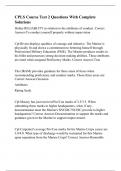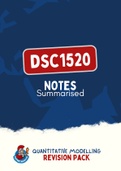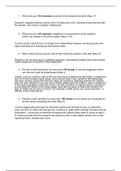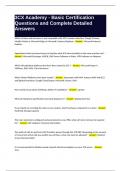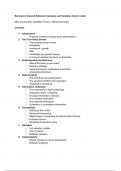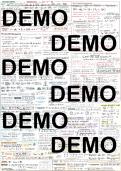Sari Segers 2612776
Economic Challenges (E_EBE1_EC)
Problem set 1
8-9-2021
I think the minor seminar is in Dutch, but to be on the safe side I wrote the assignment in
English.
1 Original text: Aristotle
a. Aristotle explains the emergence of states by looking at the state as not a fixed entity, but
rather something that is composed through various processes. This starts with husband and
wife starting a family together. When these families multiply, this leads to the emergence of
families that eventually develop into different communities. These communities then form a
city, after which the creation of several cities eventually leads to the creation of a state.
b. Aristotle sees slavery in principle as natural; according to him, some people have certain
qualities that are closer to 'lord' or 'master'. According to him, it is therefore natural that these
roles exist given that 'slaves' are natural subjects ('by nature a slave') and 'masters' are natural
rulers: ‘For that which can foresee by the exercise of mind is by nature intended to be lord and
master, and that which can with its body give effect to such foresight is a subject, and by
nature a slave; hence master and slave have the same interest.’ (p. 5)
c. The main difference between 'the art of household management' and 'the art of getting
wealth' is that the art of getting wealth is inherently focused on an outcome. However, this is
also present in the art of household management, but to a limited extent: ‘so in one way the art
of household management, in another way the subordinate art, has to consider about wealth’
(p. 11). Wealth is not the only aspect that matters in the art of household management. → I
find this a very complex question
d. A fragment where Aristotle makes a distinction between use value and exchange value can
be seen in the following: ‘For example, a shoe is used for wear, and is used for exchange;
both are uses of the shoe. He who gives a shoe in exchange for money or food to him who
,wants one, does indeed use the shoe as a shoe, but this is not its proper or primary purpose,
for a shoe is not made to be an object of barter. The same may be said of all possessions, for
the art of exchange extends to all of them, and it arises at first from what is natural, from the
circumstance that some have too little, others too much.’ (p. 9)
e. Aristotle refers to the fable of King Midas in part IX to show the difference between use
and exchange value; the use value of gold is limited since one can practically do less with
gold than with food. The exchange value of gold, on the other hand, is considerable. Aristotle
shows that someone who has a lot of exchange value, but little use value in his possession is
not necessarily rich.
f. Usury is seen by Aristotle as morally wrong because a profit is made on the money itself
(interest) instead of the purchase itself. According to him, this is not what money should
primarily be used for (only as a 'medium of exchange').
g. Aristotle refers to the anecdote of Thales the Milesian in part XI to illustrate how the
emergence of a monopoly can lead to relatively easy profit gain: ‘Thus, he showed the world
that philosophers can easily be rich if they like, but that their ambition is of another sort. He is
supposed to have given a striking proof of his wisdom, but, as I was saying, his device for
getting wealth is of universal application, and is nothing but the creation of a monopoly.’ (p.
12).
h. Unlike Plato, Aristotle is generally positive about the possession of private property
(compared to common property). He argues this by stating that one generally handles property
better when it is their own property because ‘every one will be attending to his own business’
(p. 13).
2 Economic challenges
a. Three examples surrounding the theme ‘Markets and Morality’ are:
❖ Companies which produce Covid-19 vaccines yet keep raising their prices even if
there is a big demand for these vaccines in for example third world countries.
, ❖ The Dutch government (in particular VVD) that considered abolishing dividend tax so
that companies stay here while at the same time they are the companies that are partly
responsible for climate pollution (think of Shell, for example).
❖ Pyramid schemes
b. An example of a contemporary discussion on just prices is the healthcare system in the
United States. This care can be morally seen as a basic human need (security) but is for some
people unaffordable in the United States and ethically unjust. The idea that prices are always
'just' because no one is forced to buy an expensive product is therefore not legitimate in this
case. Some people are unable to buy these products when they can be vital. The idea that
'nobody is forced to buy an expensive product' only applies when there is a choice, this is not
always an option. In that sense prices can also be unjust.
c. I am not quite sure if usury still exists in the current low interest rate environment we live
in. In the western world we now have a legal maximum of interest. The role of interest in
Islamic finance is that, relatively speaking, there should be no question of too high an interest
rate. Here, moreover, in some places one can borrow without any interest at all.
d. The American subprime crisis during 2007 and 2008 was a result of banks providing loans
to people in the housing market. Sometimes these loans were too high, creating a group of
people who could no longer repay the loans. The figure shows how the prices of the housing
market rose during this period. This was due to the fact that many people could get a loan,
even though they could not actually pay it. This created the opportunity for many more people
to buy a house. After this, a financial crisis arose which can also be seen in the figure (a sharp
decrease).
e.
❖ I do not agree with the following point of view ‘Somebody argues that the borrowers
(often low income families) are to blame because they took on loans of which they
knew in advance that the chance of default was large.’ as I think that most of these
borrowers were unaware of how this system worked because low income families are
often lower educated.


